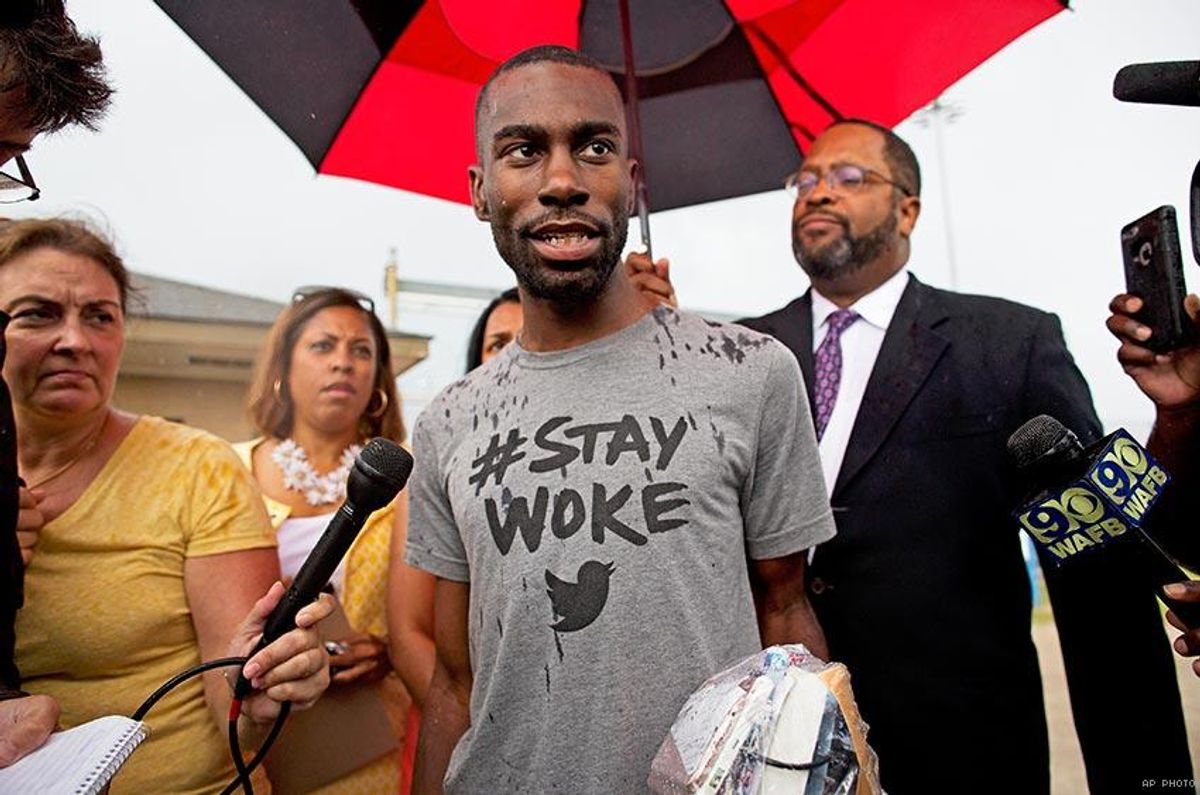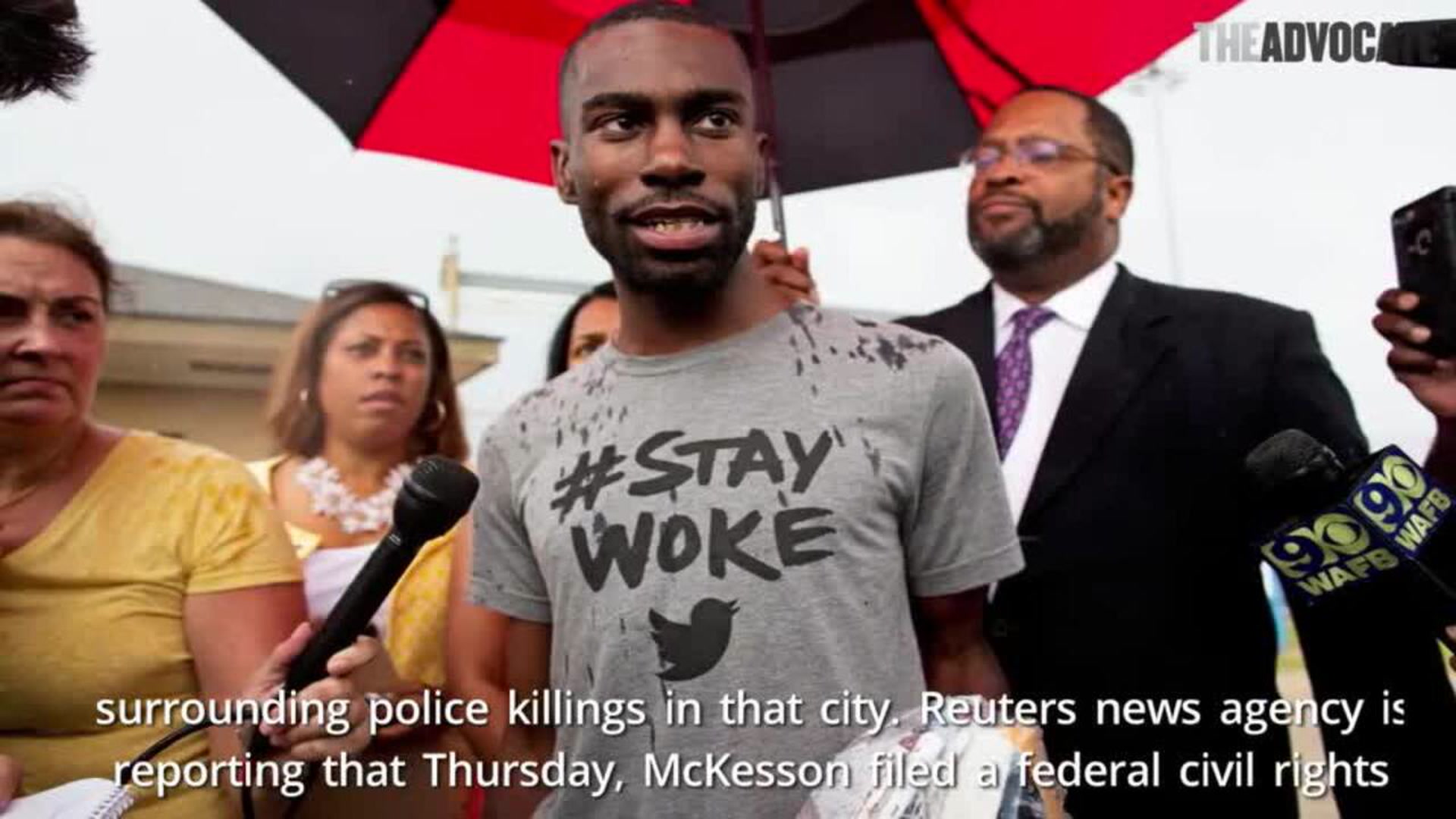Out activist DeRay Mckesson filed a federal class-action lawsuit Thursday against the City of Baton Rouge for what he alleges was "excessive force" used by law enforcement during Mckesson's July 9 arrest in Louisiana.
Mckesson, a prominent organizer within the Movement for Black Lives who has been at the front lines of nationwide protests against police brutality, was one of the 200 activists detained in Baton Rouge during protests following the death of Alton Sterling. Activists took to the streets after the 37-year-old black man from Louisiana was shot and killed by police while officers had him pinned to the ground on July 5.
Mckesson is the named plaintiff in the federal class action lawsuit, which claims that officers "employed unconstitutional tactics to disturb, disrupt, infringe upon and criminalize plaintiffs and class members' constitutional rights to freedom of speech and assembly." These tactics included "attacking, battering, beating and assaulting plaintiffs and class members without provocation or the need for defense," the suit continues.
Mckesson and other activists were charged with "simple obstruction of highway commerce," after police claimed that protesters were blocking traffic on a local highway. But Mckesson's lawyer, Roy J. Rodney Jr., refutes that claim, saying activists organized in areas that would not impede the flow of traffic.
In the live video Mckesson streamed through Periscope during his arrest, a fellow demonstrator can be heard telling police that there is no sidewalk for them to traverse, and explaining that activists were walking on the shoulder, not directly in the road.
What's more, the highway in question had been closed by police during the protest, Rodney said.
"How can you obstruct a highway that's closed to traffic?" Rodney asked the Baltimore Sun. "[Police] arrested people who had left the highway and entered private houses or gathered on private property."
Those arrested included activist and 2016 Socialist Party presidential candidate Gloria La Riva, but charges against her were later dropped.
Mckesson's lawsuit aims to have his and other protestors' court costs reimbursed by the state, alleging that his defense was at great personal expense. He is also lobbying to ensure that the "records of all illegally arrested protesters are expunged," Mckesson told the Sun.
"The courts are an important lever by which we can hold cities accountable for engaging in unconstitutional practices," he added.
"Many of these protesters were young people," Rodney explained to the Sun. "They don't have money to pay these fees. They should not have the stigma of an unlawful arrest to follow them in the digital age. ... The people covered by this class are teachers and nurses and doctors and students. To have a false arrest is not helpful to them."
Louisiana State Police Superintendent Col. Michael Edmonson stands by the actions of law enforcement.
"I didn't witness any aggressive form of behavior by any police officer," he said, telling the Sun that police "exercised great restraint" in handling the situation. Edmonson, who has been named as a defendant, claims that he has yet to see the lawsuit.
Mckesson isn't the first to allege mistreatment at the hands of Baton Rouge police officers.
In addition to Mckesson's class action lawsuit, the American Civil Liberties Union of Louisiana has filed a federal suit against the city over the police response to the July protests. Like Mckesson's, the ACLU suit claims that police used "excessive force, physical and verbal abuse, and wrongful arrests to disperse protesters who were gathered peacefully to speak out against Sterling's death," as People reports. The suit further alleges that police infringed upon protestors' constitutionally guaranteed right to free speech and peacible assembly -- a complaint addressed in Mckesson's suit, as well.
Tragically, Sterling is one of many black victims who have made headlines after being killed by police officers in recent years. He was shot while selling CDs and DVDs outside of a convenience store, in an encounter that was captured by a bystander on cellphone video. Just one day later, a Facebook Live video showed the terrifying moments after Philando Castile, a black man and school cafeteria supervisor in Minnesota, was fatally shot by a white police officer during what was billed as a "routine traffic stop."
In the wake of the unabated string of deadly police shootings -- which overwhelmingly claim the lives of black people, even when they are unarmed -- the Movement for Black Lives this month released a comprehensive platform, "A Vision for Black Lives," which not only calls for an end to the "war on black people," but also demands an end to the brutalization and criminalization of black LGBT people, who have a disporportionately high rate of negative interaction with law enforcement and the criminal justice system.


















































































